-
Winning animation in Critics' Week.
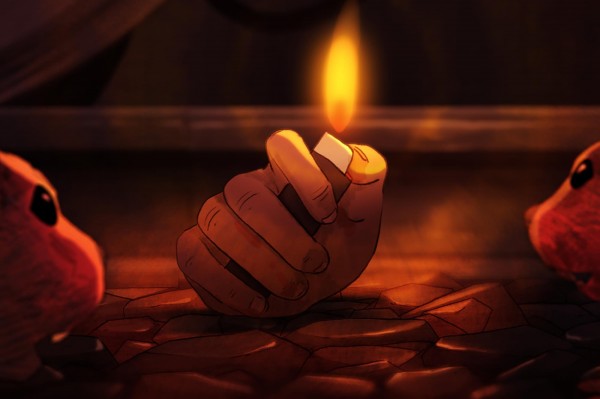
STILL FROM ANIMATED PRIZEWINNER I LOST MY BODY
I Lost My Body/J'ai perdu mon corps (Jérémy Clapin). Critics' Week.
French filmmaker Jérémy Clapin’s feature-length animation J'ai perdu mon corps (the original French title) garnered the top award, the Nespresso Grand Prize, at Cannes’ Critics' Week, the prestigious parallel section aimed at emerging directors and showing shorts and first and second-time films. "It's time for animated films to stop being considered a separate genre," Clapin delcared. The film concerns a young man's severed hand that goes looking for its body. It stood out, says Variety's Guy Lodge, for being the only "toon" in the sidebar, and also for its "blend of morbid humor and touching drama.:" The film's producer Marc de Pontavice said in an interview in AlloCiné it was the challenge of arousing audience sympathies for an object that drew him to the story, and he liked the idea of a part longing for the whole rather than the reverse. The film will go to the big Annecy animation fest, and is looking for a distributor.
Last edited by Chris Knipp; 05-26-2019 at 10:36 PM.
-

DAKOTA JOHNSON, ARMIE HAMMER IN WOUNDS
Wounds (Babak Anvari). Directors Fortnight.
This Netflix-sponsored horror flick, an adaptation on Nathan Halligrud's novelThe Visible Filth, is British-Iranian director Anvari's sophomore film following his 2016 Under the Shadow (" a retro spook story set in ’80s Tehran" - Variety), but is much cruder and a bust, says Peter Bradshaw in his Guardian review. Armie Hammer is a college dropout tending bar at "a rough dive in New Orleans" who dates Dakota Johnson's Eng. Lit. grad student but is enamored of Zazie Beetz, who drinks at his bar with her boyfriend. Things get supernatural and super-creepy for Armie when there's a bad fight and a student leaves behind a cell phone with a video of it that Armie opens. (The debt to J-horror is clear.) Hammer, says Bradshaw, seems to be competing "for a bad-acting award" and givesWounds 2 out of 5 stars. Variety says it's "a spooky, silly body-horror flick that's thrilled to torture Armie Hammer." Amy Nicholson's Variety review suggests this may be a fun picture for younger audience members, and Bradshaw may miss the humor in how Armie is used by Anvari in it, but not a very good movie: Screen Daily says it has "some shockingly uninspired jump-scares" and Erlich in IndieWire calls it "a woefully underwritten jump-scare machine." It debuted at Sundance; perhapas there was no need to review it here.
Last edited by Chris Knipp; 05-26-2019 at 10:38 PM.
-

WILLIAM LEBGHIL IN ALL ABOUT YVES
All About Yves/Yves (Benoît Forgeard). Directors' Fortnight.
The French director Benoît Forgeard's second feature closed out the Directors' Fortnight in Cannes. It is a screwy comedy something like if John Waters made a movie where a "wannabe rapper" (William Lebghil), his dream girl (Doria Tillier), and a talking fridge all have sex at one point, says Jordan Minter in his Hollywood Reporter review, which says it "overstays its welcome" but is also "a memorably weird experience." Yves is the name of the fridge, which Lebghil's character is a product-tester for, "a Sub-Zero-type device inhabited by the mind of 2001’s HAL 9000 and the musical prowess of contemporary beatmakers like Drake's 40 and Boi-1da," says Mintzer. The whole thing is a "spoof" on "where artificial intelligence is headed" with "smart" appliances if you imagined them capable of competing in "the Eurovision song contest," says Lisa Nesselson in her Screen Daily review, which also praises this film but similarly says it "overstays its welcome." Last year Lebghil costarred with Vincent Lacoste in the popular in France med school film The Frehshman/Première année reviewed on Filmleaf in February (R-V 2019).
Last edited by Chris Knipp; 05-26-2019 at 10:39 PM.
-
Parasite tops the Jury Grid.
As predicted, Bong Joon-ho's Parasite is the critical leader now in Competition films, according to Screen Daily's latest Jury Grid compilation of ten critics. It's now
Parasite 3.4
Portrait of a Lady on Fire 3.3
Pain and Glory 3.3
Once Upon a Time in Hollywood 3.0
With Sciamma's and Almodóvar's films tied. Xavier Dolan is "struggling" notes Screen Daily with a 1.7; only Peter Bradshaw liked it much. But while Dolan's It's only the end of the World got a 1.4 in 2016, it won the Grand Prix and the Jury Ecumenical Prize. Sometimes a Jury goes its own way.
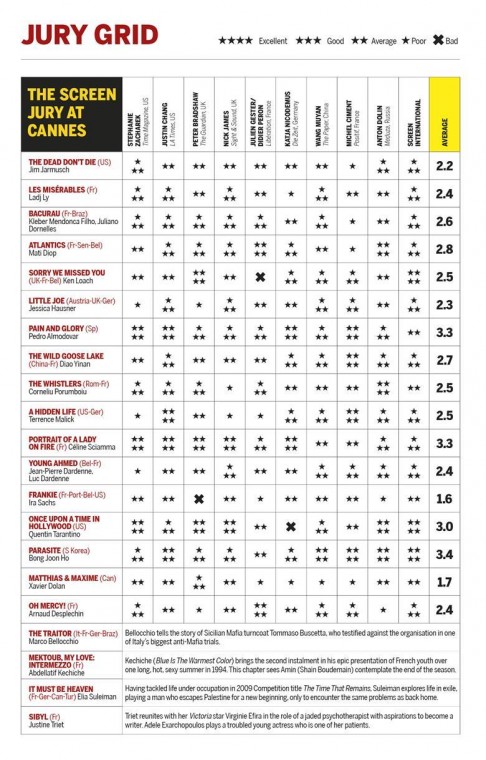
Last edited by Chris Knipp; 05-24-2019 at 02:42 PM.
-
Sidebar Cannes films.
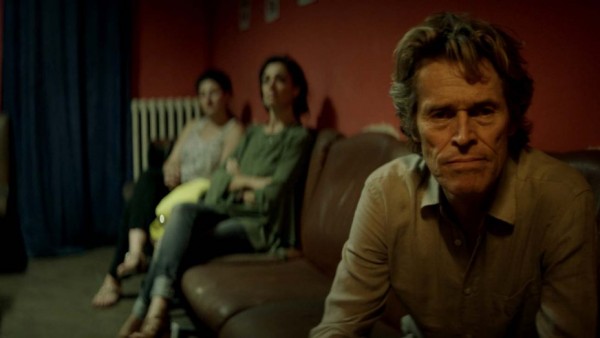
WILLEM DAFOE IN TOMMASO
Tommaso (Abel Ferrara). Special screenings.
Mainly to be watched for the performance of Willem Dafoe, who fortunately is on screen most of the time, says Todd McCarthy in his Hollywood Reporter review. This is an autobiographical piece by Ferrara about a "director and recovering addict living in Rome" to which Dafoe brings "a pulsing gusto," says McCarthy. This costars Ferrara's own wife and child, Owen Gleiberman's Variety review explains, and is a serene, literally sober piece: Tommaso is clean-and-sober and goes to 12-step meetings.
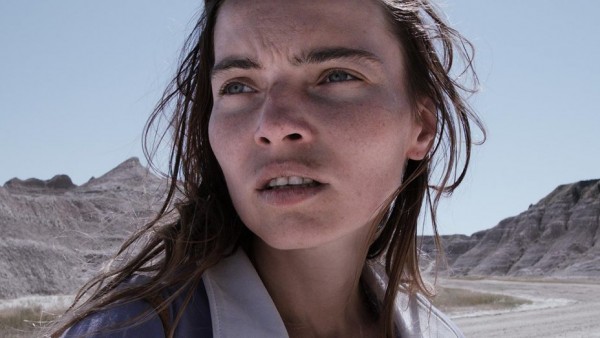
Lillian (Andreas Horvath). Directors' Fortnight.
A long-in-the-making biopic by the Austrian director/photographer Horvath of Lillian Alling, a mysterious woman who walked from New York to Alaska in 1926-27 and has been much written about, explains Deborah Young in her Hollywood Reporter review. The lead is played by newcomer Patrycja Planik, who does not speak during the film. A strange tale of a homeless person headed back to Russia because her chances of work in America have vanished, this is a foreigner's depiction of the US (perhaps an updating of Robert Frank's The Americans?).
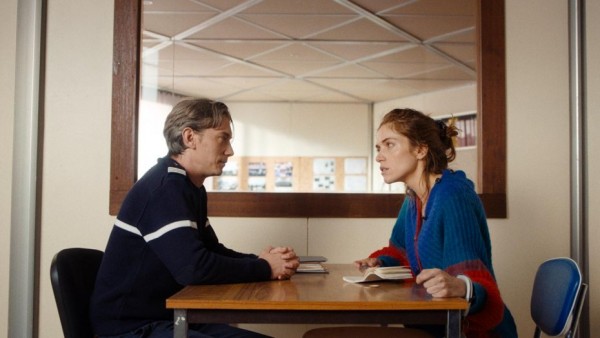
The Bare Necessity/Perdrix (Erwan LeDuc). Directors' Fortnight.
Debut feature from a French sports journalist is another sui generis creation featuring WWII relics, a crateful of personal journals, and nudists, an oddball family with some sleeping around and a police captain in a sleepy village in the northeastern Vosges region, says Boyd van Hoeij in his Hollywood Reporter review which calls this "Not perfect, yet easy to love." The aim is an amorous comedy, and an examination of love, and features a sleeping-around Fanny Ardant as " host of a radio show called Love Is Real." The film should "consolidate the reputation" of lead actor Swann Arlaud, following his s"tar-making turn" in Bloody Milk in the 2017 Critics’ Week, which was "a drama with fascinating thriller and genre notes," says van Hoeij.
Last edited by Chris Knipp; 05-26-2019 at 10:45 PM.
-
Cannes May 23
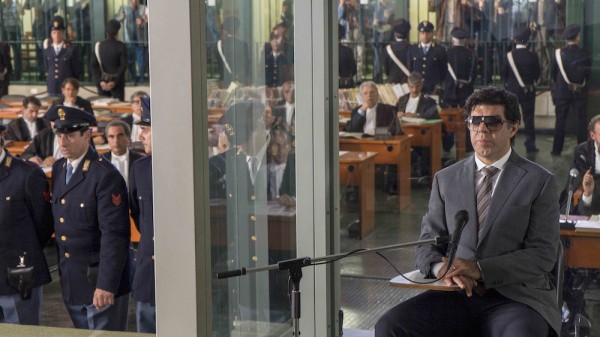
PERFRANCESCO FAVINO IN TRADITORE
The Traitor/Il traditore (Marco Bellocchio). Competition.
This is the only Italian film in Competition at Cannes this year. It features another Tommaso, Tommaso Buscetta, "the highest level Mafia don to sing to authorities." This tale of a Mafia "pentito" is "a master filmmaker questioning the nature of repentance," says Jay Weissberg in his Variety review. Weissberg was expecting another theatrical film on the order of Bellocchio's Vincere, but this is mostly surprisingly "straightforward," he says; the director must have figured the story had "built-in theatrical flourishes" enough. Popular actor Pierfrancesco Favino was "never better," says Weissberg. He makes his character "a commanding presence as Buscetta — imposing but also unknowable," says Tim Grierson in his Screen Daily review. Buscetta revealed "Sicily's criminal hierarchy" in a series of "dramatic testimonies" some of which are available on YouTube. Weissberg explains that he turned because the Cosa Nostra had betrayed its own family values, its leaders beginning to murder women and children, "a step too far" for him. Luigi Lo Cascio is featured as a fellow informer, hitman Totuccio Contorno, speaking in Sicilian dialect. The courtroom scenes are the centerpiece of the film, but the ones showing the lead-up are important. Weissberg suggests more of Buscetta's criminal life might have been shown. The grand picture is handsomely done, but Bellocchio risks " making Buscetta look like an attractive ladies’ man who did a few bad things in his life but repented when he realized how much he loved his wife and kids." Grierson is more critical, but both he and Weissberg compliment dp Vladan Radovic for tiving the film visuals, which encompass scenes in Brazil as well as Italy, "the scope and grandeur of a crime epic" (Screen Daily). David Erlich's IndieWire review finds The Traitor "lively but scattershot and exasperating biopic," best when it departs from historical fact, too seldom cracking its own "brittle surface," its courtroom drama section "repetitive and somewhat impenetrable."
Last edited by Chris Knipp; 05-26-2019 at 10:46 PM.
-
Cannes May 24
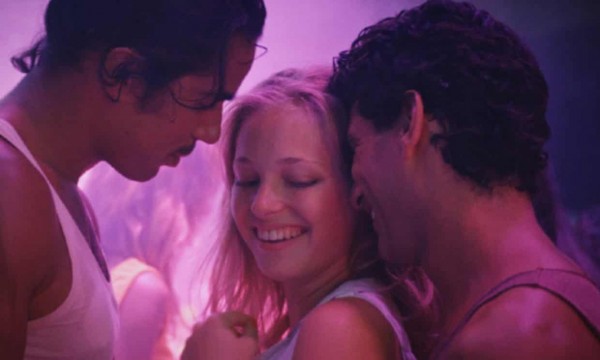
Mektoub My Love: Intermezo (Abdellatif Kechiche). Competition.
Peter Bradshaw, who approved Kechiche's previous feature, Mektoub My Love: Canto Uno (which never got US distribution), as being justified and "interesting," departs company from him with the new film, which he says is "colossally self-indulgent" and "blows its cinephile credentials in four hours [actually 3 hours 26 minutes] of indulgent sweat" and indulges a "female buttock fetish" from virtually the first frame. He gives it a miserable 2 out of 5 stars in his Guardian review. Bradshaw says this is "the most purely experimental film" in this year's Cannes Festival. It has a scene on a beach and then a scene in a nightclub that lasts "a staggering three hours" and adds up to a "monumental photolove-smutfest." The previous "Mektoub" film was accused of "the toxic male gaze," but, Bradshaw points out, it was not a "white gaze," because of Kechiche's sharp, "sympathetic eye" for the " North African communities in Sète," in southern France where it and The Secret of the Grain were filmed. Justin Chang, now with the LA Times, calls this film "the disaster of the Cannes Film Festival." Chang notes Kechiche won the Palme d'Or six years ago for his young lesbian love story, Blue Is the Warmest Color. Subsequently the leads, Léa Seydoux and Adèle Exarchopoulos, described the shoot in ways that made Kechche sound abusive and over-demanding on set, and he's come on the wrong side of the #MeToo movement. Here, says Chang, he "sells out his own talent." Guy Lodge in his Variety review leads up more gently to his pan, but eventually says "Intermezzo" is "vacuous, almost spitefully monotonous." The only plot setup is in the opening beach segment, he explains; the three-hour nightclub part is just ogling visuals. This came out at the absolute bottom of the Jury Grid, 1.5.
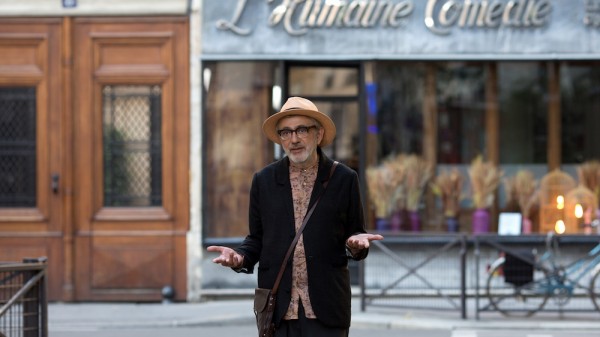
Elia Suleiman in It Must Be Heaven
It Must Be Heaven (Elia Suleiman). Competition.
Suleiman, playing a version of himself, travels from his native Nazareth to Paris, Montreal, and New York looking for a producer for a film in his new feature, It Must Be Heaven, while finding surprising parallels with his Palestinian homeland, of which he now sees the rest of the world as a "microcosm." In his "delightfully absurdist, unfailingly generous gaze" he stands apart from a "Palestinian landscape generally perceived as monolithic," his distinctive work by now "not just well-known but eagerly anticipated," says Jay Weissberg in his Variety review. Acting in his own films (here wordlessly), Suleiman's "wide-eyed, expressive face" Weissberg adds, is now "forever compared with Buster Keaton" as he regards "a world full of small wonders and incongruities." It's been ten years since he released a feature. This time the style still "has all the hallmarks," but the "vision shifts" from the "struggle in Palestine" to the "condition of the global Palestinian." Weissberg foresees a positive reception worldwide. Peter Bradshaw gives This Must Be Heaven 3 out of 5 stars, but with reservations. "The latest satire-fable from Elia Suleiman," he writes, "is as droll as ever, but while there’s a kernel of seriousness here it too often lapses into elusive mannerism." Deborah Young is far more appreciative in her Hollywood Reporter review, which starts by saying Suleiman "uses his own face and body to express the soul of Palestine in his films," and "never more so" than this time. And though he thought Palestine was the world of guards and check-points, he finds the rest of the world too has become a police state, full of arms and menace. Yet all this is depicted with the lightest of touches, Young shows. It Must Be Heaven wound up with a 2.6 on the Jury Grid, on a par with The Traitor and Bacaru. The film wound up with the Jury Special Mention award.
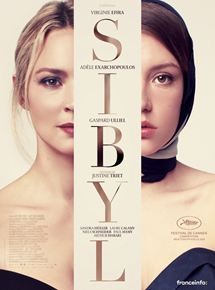
Virginie Efira, Adèle Exarchopoulos, Sibyl poster
Sibyl (Justine Triet). Competition.
It's a comedy about a jittery, tippling shrink with Virginie Efira, Adèle Exarchopoulos, Gaspard Ulliel, and others in the cast. AlloCiné's press rating is 4.0, a chorus of raves, really (with Cahiers du Cinéma the most enthusiastic, always unusual), while Bradshaw in his Guardian review calls it a "muddled, silly comedy" and gives it only 2 out of 5 stars. Eric Kohn of IndieWire sees the film as "a stylish thriller with dark ideas about the dangers of storytelling" that deliberately unwinds a "ludicrous soap-opera mess" of a plot. Virginie Efira, star of Triet's 2016 In Bed with Victoria, is the psychiatrist who records distraught new patient Adèle Exarchopoulos, an actress tormented by an unwanted pregnancy by coming costar Gaspard Ulliel, shrink planning to use her new patient's story in a novel, but also tormented herself by memories of old flame Niels Schneider - and also with doubts about her deception. Her own shrink tells her to stop analyzing Adèle's character because she can't even analyze herself. Like Assayas' recent Non-Fiction, says Kohn, this is "a riotous sendup of the dangers facing narrative in an age of distraction." Guy Lodge in his Variety review calls this "a highly pleasurable collaboration" (with Efira) that's "a witty, slinky psychodrama with just enough on its mind." This setup sounds like Ozon, and indeed Lodge calls Sibyl "certainly the most purely enjoyable French fancy to play in Cannes’ top tier since François Ozon’s Double Lover two years ago." Having loved In Bed with Victoria, though my colleagues at the Rendez-Vous with French Cinema din't seem to get much out of it, I can't wait to see Sibyl. Kohn says this is Exarchopoulos' "most involving turn" since Blue Is the Warmest Color," and the rest of the cast sounds tasty. It did not do fabulously on the Jury Grid though, ;winding up with 1.8, fourth from the bottom.
Last edited by Chris Knipp; 06-08-2019 at 01:14 AM.
 Posting Permissions
Posting Permissions
- You may not post new threads
- You may not post replies
- You may not post attachments
- You may not edit your posts
-
Forum Rules





 Reply With Quote
Reply With Quote










Bookmarks